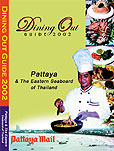by Dr. Iain
Corness
 The executive chef for the soon-to-be-opened Jomtien Boathouse is an ambitious young Thai, Naruk Morakran. He is someone who has spent most of his life in Denmark and has managed the rare feat of being able to extract the best out of both cultures.
The executive chef for the soon-to-be-opened Jomtien Boathouse is an ambitious young Thai, Naruk Morakran. He is someone who has spent most of his life in Denmark and has managed the rare feat of being able to extract the best out of both cultures.
Naruk was born in Ubon Ratchatanee in Esarn. His father was a soldier, but he died when Naruk was very small. His mother remarried a Danish engineer and Naruk (the only child) and his mother relocated to Denmark when he was 9 years old.
His schooling was then in Denmark, and like most children, quickly learned the new language. However, his mother would speak Thai to her young son at home. His stepfather also arranged for Naruk to return to Thailand regularly to keep in contact with his family. So he became multilingual, also learning English at school to give him, at that point in his life, three languages. However, he does admit that his Danish is better than his Thai. “I still have some problems with pronunciations and grammar, but I can read the newspapers.”
During his secondary schooling he would help out by having an after school job. These were mainly in hotel kitchens, where he learned what life was like on the lowest rung of the ladder. However, this did not put him off in any way. His mother was also interested in cookery and had undergone training as a young girl herself, and fostered the concept with her son.
The decision having been made, Naruk went to a hotel and restaurant management college in Denmark to study to be a chef. This was in one of the oldest colleges specialising in this type of training, and their course is the longest in the world. This college is considered to be ranked higher than even the famous Cordon Bleu. Four and a half years later he graduated as a chef. However, he did not stop there, by now totally immersed in the hospitality industry. He went back to study wines and restaurant management for another 2 years!
During this time of training it was not all theory and no practice. Naruk would be seconded to various establishments to apply his new skills, and learn also the discipline of the kitchens. One of his placements that he really enjoyed was the Savoy in London, one of the most famous hotels in the world. It was here that Auguste Escoffier, “the king of chefs and the chef of kings” (1847-1935) had worked, the chef who had invented the Peach Melba (named after Dame Nellie Melba) and a chef whose work Naruk had studied in college. Escoffier had said about soups, “Soup puts the heart at ease, calms down the violence of hunger, eliminates the tension of the day, and awakens and refines the appetite”. 100 years later, his disciple Naruk said, “To me, to make food is a kind of art. Every dish has personality.” As he said these words, Naruk’s hand was over his heart. Undoubtedly, part of Naruk’s soul goes into his dishes. He may have read Escoffier’s books, but to Naruk, feeling the “presence” in places such as the Savoy was just as important. “You can’t get better by just reading a book. You can’t do it in this profession.” Naruk also worked in France in a Michelin 3 star hotel in Alsace, polishing up his French as well as his culinary skills, to make him now fluent in four languages.
Naruk had also become a polished performer in his own right too, with a TV cooking programme, a contributor of recipes to an internet newspaper and a regular guest on Danish talk shows. Thailand’s TV5 station even sent a crew to Denmark to interview this young chef last year. He was also a member of the European Union of Chef’s, the only Thai national to be so honoured.
Despite all this, he also began to feel bored in his adopted country of Denmark. During his trips back to visit his relatives in Thailand, Naruk had seen a gradual change in the culinary scene in this country. “Now the food in Thailand has caught up. Ten years ago it was what had been done in Europe 30 years ago.” He also had some personal goals and Thailand looked to be a way to achieve some of these. “I am quite ambitious. I set a goal that I wanted to be a Chef de Cuisine in gourmet restaurants.” At that point in his life in comes local identities, Ib and Kannikar Ottesen with their new venture, the Jomtien Boathouse, on Jomtien Beach Road, which will feature a gourmet restaurant on the ground floor.
So Naruk Morakran has returned to his roots, and in some ways is strongly nationalistic. His dishes are not just traditional, but incorporate a fusion of styles, with Thai being one of them. He does also feel that slavishly importing European ingredients is often unnecessary as the local produce here is of such high quality. “I want to get a focus as a Thai chef being able to cook European food.”
On the other hand, he is very international in his likes and attitude. Wine is a favourite, but he does not rate the local product highly in this instance. “The climate is not correct for wine making here.” His own preferences run to the Californian Zinfandels and some of the Australian wines.
Naruk is obviously a young man on the way up and his advice to those contemplating a career in the kitchen was spoken with passion. “If you want to be a chef - it must come from the heart. It is hard. You must work weekends and nights when everyone else has time off. It is hot. It is hard. It is not easy. It is not luxury.”
However, it is a life that young Naruk would not exchange for any other. He is a man with cooking in his own heart. Welcome to Pattaya, Naruk Morakran.

 The executive chef for the soon-to-be-opened Jomtien Boathouse is an ambitious young Thai, Naruk Morakran. He is someone who has spent most of his life in Denmark and has managed the rare feat of being able to extract the best out of both cultures.
The executive chef for the soon-to-be-opened Jomtien Boathouse is an ambitious young Thai, Naruk Morakran. He is someone who has spent most of his life in Denmark and has managed the rare feat of being able to extract the best out of both cultures.
